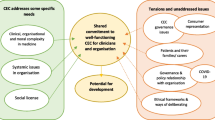Abstract
The clinical encounter between providers and patients is insufficient: most factors influencing health outcomes occur outside the clinic. Community Health Needs Assessments address this insufficiency via collaboration between hospitals and the communities they serve to address systemic sociological-economic variables impacting health outcomes. Considering this, why are Health Care Ethics Consultation (HCEC) services limited to the clinical setting? We can cultivate better ethics outcomes by addressing systemic sociological-economic factors that cause recurring ethics issues in the hospital. In this article, I argue for the need for a Community Ethics Needs Assessment (CENA). CENA is a novel concept; thus, this article is exploratory. I argue for the necessity of a CENA and, more importantly, outline what methodology a CENA would use to both identify and address an ethics need.
Similar content being viewed by others
References
Chen, Y., Chu, T., Kao, Y., Tsai, P., Huang, T., & Ko, W. (2014). To evaluate the effectiveness of health care ethics consultation based on the goals of health care ethics consultation: A prospective cohort study with randomization. BMC Medical Ethics,15(1), 1-8.
Daly, G. (2000). Ethics and economics. Nursing Economics,18(4), 194–201.
Dowdy, M. D., Robertson, C., & Bander, J. A. (1998). A study of proactive ethics consultation for critically and terminally ill patients with extended lengths of stay. Critical Care Medicine,26(2), 252–259.
Farley, T., & Cohen, D. A. (2005). Prescription for a healthy nation: A new approach to improving our lives and fixing our everyday world. Boston: Beacon Press.
Foglia, M. B., Fox. E, Chanko, B., & Bottrell, M. M. (2012). Preventive ethics: Addressing ethics quality gaps on a systems level. The Joint Commission Journal on Quality and Patient Safety, 38(3): 103–111, AP1–AP7.
Fox, E., Berkowitz, K. A. Chanko, B. L., and Powell, T. (n. d.). Ethics consultation: Responding to ethics questions in health care. National Center for Ethics in Health Care: Veterans Health Administration
Fox, E., Bottrell, M. M., Berkowitz, K. A., Chanko, B. L., Foglia, M. B., & Pearlman, R. A. (2010). IntegratedEthics: An innovative program to improve ethics quality in health care. Innovation Journal,15(2), 1–36.
Fox, E., Myers, S., & Pearlman, R. A. (2007). Ethics consultation in United States hospitals: A national survey. The American Journal of Bioethics,7(2), 13–25.
Furrow, L., Arnold, R. M., & Parker, L. S. (1993). Preventive ethics: Expanding the horizons of clinical ethics. Journal of Clinical Ethics,4(4), 287–294.
Gibbs, L., Gold, L., Kulkens, M., Riggs, E., Gemert, C. V., & Waters, E. (2008). Are the potential benefits of a community-based participatory approach to public health research worth the potential costs? Just Policy,47, 54–58.
Heilicser, B. J., Meltzer, D., & Siegler, M. (2000). The effect of clinical medical ethics consultation on healthcare costs. Journal of Clinical Ethics,11(1), 31-38.
Hoeft, T. J., Burke, W., Hopkins, S. E., Charles, W., Trinidad, S. B., Jaes, R. D., et al. (2014). Building partnerships in community-based participatory research: Budgetary and other cost considerations. Health Promotion Practice,15(2), 263–270.
Kindig, D., & Stoddart, G. (2003). What is population health? American Journal of Public Health,93(3), 380–383.
Kirk, C. M., Johnson-Hakim, S., Anglin, A., & Connelly, C. (2017). Putting the community back into community health needs assessments: Maximizing partnerships via community-based participatory research. Progress in Community Health Partnerships: Research, Education, and Action,11(2), 167–173.
Minkler, M., Garcia, A. P., Rubin, V., & Wallerstein, N. (2012). Community-based participatory research: A strategy for building healthy communities and promoting health through policy change. Oakland: PolicyLink.
Nelson, W. A., Gardent, P. B., Shulman, E., & Splaine, M. E. (2010). Preventing ethics conflicts and improving healthcare quality through system redesign. Quality and Safety in Healthcare,19(6), 526–530.
Robert Wood Johnson Foundation. (n. d.). County health rankings model. County Health Rankings & Roadmaps. Retrieved May 7, 2019, from http://www.countyhealthrankings.org/explore-health-rankings/measures-data-sources/county-health-rankings-model.
Robinson, E. M., Cage, W., Erler, K., Brackett, S., Bandini, J., Cist, A., et al. (2017). Structure, operation, and experience of clinical ethics consultation 2007-2013: A report from the Massachusetts General Hospital Optimum Care Committee. The Journal of Clinical Ethics,28(2), 137–152.
Schneiderman, L., Gilmer, T., & Teetzel, H. D. (2000). Impact of ethics consultations in the intensive care setting: A randomized, controlled trial. Critical Care Medicine,28(12), 3920–3924.
Scofield, Giles R. (2008). What is medical ethics consultation? Journal of Law, Medicine, & Ethics,36(1), 95–118.
Acknowledgements
The author would like to thank the following for their invaluable help, comments, and criticisms: Marion Danis, Michael S. Dauber, Caroline Golab, Drew Harris, Arielle Kuperberg, Yosef Kuperman, Renee McLeod-Sordjan, Nicholas Mercado, Samuel Packer, and Anita Tarzian.
Author information
Authors and Affiliations
Corresponding author
Ethics declarations
Conflict of interest
The author has no conflict of interest to disclose.
Additional information
Publisher's Note
Springer Nature remains neutral with regard to jurisdictional claims in published maps and institutional affiliations.
Rights and permissions
About this article
Cite this article
Kuperberg, E. Clinical Ethics Needs Assessment: Adapting Clinical Ethics to a Population Health Program. HEC Forum 32, 21–32 (2020). https://doi.org/10.1007/s10730-019-09386-4
Published:
Issue Date:
DOI: https://doi.org/10.1007/s10730-019-09386-4




